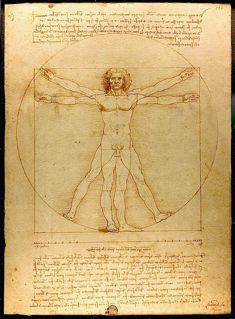 Leonardo DaVinci took great care centuries ago to represent the human body of a male as if illustrating the architecture of a fine building in his world famous drawing of Vitruvian Man.
Leonardo DaVinci took great care centuries ago to represent the human body of a male as if illustrating the architecture of a fine building in his world famous drawing of Vitruvian Man.
Centuries later, one has to wonder if today some men take better care of their dwellings and their cars than they do themselves?
Some men tend to take great pride in their cars and/or may see the type & condition of their dwelling to reflect back on themselves as a status symbol image in their lives.
Vitruvian Man Illustration Photography credit: Luc Viatour
What can family, friends, and communities do to help the men they care about take better care of themselves right now?
Perhaps a male RD who likes to be known as the “Guyatitian” can shed a little bit more light on the subject of getting men to consider looking more carefully at their eating habits and lifestyle to determine if it might be time for any makeovers and how to potentially implement same.
David Grotto, RD, LDN in a column for WebMD, noted the following: “Guys aren’t always driven to make lifestyle changes simply based on a diagnosis or a set of bad lab tests. Unless there is compromised physical, mental or sexual performance at stake, most guys won’t budge on their daily routine. If there is the slightest hint of deprivation or feeling that they’re being sentenced to lifelong dietary boredom, any hopes of adopting healthy habits will come crashing down like a house of cards.”
His advice for those who live with men: “Taste and satisfaction must come first.” “Base [any suggestions for] change on seeking optimal performance” per se, which makes sense in light of how sports-oriented so many men are.
As Jim White, RD, also noted on behalf of the Academy of Nutrition and Dietetics in that press release of 8JUNE2012 mentioned in yesterday’s blog post (Part 1 of 2), men want to be staying “strong” and “in the game” as long as they can as they age.
If you have any man (men) in your life that you care about, help him (them) to do just that.
Note: Please remember that this site only provides infotainment, but we are happy to quote the advice provided by various registered, licensed and/or appropriately certified health care professionals around the country–just remember to check with your own health care providers regarding what is recommended by them specifically when it comes to any unique individual’s health.
According to Jim White, RD, in that press release, echoing some advice from choosemyplate.gov, “a healthy diet” [for healthy men without any contraindications including other medical conditions and/or food allergies, sensitivities or intolerances] includes:
- Filling half your plate with fruits and vegetables. “Be sure to include tomatoes or something made from tomatoes like pasta sauce because research indicates that the antioxidant lycopene found in tomato products may help prevent prostate cancer.”
- Making at least half of your grains, whole grains. Replace refined grains with whole-grain bread, cereal, pasta, brown rice or oats.
- At least two to three 8-ounce servings of fish per week. Choose lean meats.
- At least 38 grams of fiber a day for younger men; 30 grams of fiber a day for men older than 50
- Choosing unsaturated fats like oils, nuts and salad dressings instead of saturated fats like full-fat dairy foods, butter and high-fat sweets
- 4,700 milligrams a day of potassium from fruits, vegetables, fish and milk
- Less sodium than you think. The 2010 Dietary Guidelines for Americans recommend consuming 2,300 milligrams of sodium per day, which is about 1 teaspoon of salt.”
You can also easily access another quick-to-read brochure “Why Do Fruits and Vegetables Matter to Men” compliments of the CDC and the Fruits and Veggies Matter website.
And men, check out David Grotto’s May 21, 2012 blog post on his own site for his suggestions for Father’s Day this year.
You can also review an August 2010 U.S. Department of Health and Human Services Agency (USDHHS) publication advising potential health care screenings to consider entitled “Men: Stay Healthy at Any Age.”
Additionally, keep in mind the position statements by organizations who are members of the Choosing Wisely® campaign on the site of the same name of the American Board of Internal Medicine Foundation (AIBM)–that site is sponsored in conjunction with many other professional medical societies–for more details on both proper use (as well as overuse of lab testing to avoid) in today’s health care system.
According to the Choosing Wisely® campaign, not all persons necessarily need a physical exam every year, nor blood tests run every year. Discussing these matters with a knowledgeable physician who keeps current is advisable. Although not all clinicians will be in complete agreement with them, you can read about the current recommendations of the United States Preventive Services Task Force here.
For a listing of some tests (taken from the partners of the Choosing Wisely® campaign) which might possibly be overkill and actually overtaxing our health care system while overspending our hard earned dollars, see a NY Times article written on the subject.
Some lab tests may be unnecessary if a person is otherwise considered healthy, so always check with your physician concerning her or his advice when it comes to your own health matters.
June is a perfect month to be pro-active and take advantage of the bounty of vegetables and fruits that are in abundance at Farmers Markets and grocery stores alike and use them upon which to build your holiday and everyday meals this summer.
As the wise physician, Hippocrates, stated centuries ago: “Let thy food be thy medicine and thy medicine be thy food.” Great advice that still is so applicable today!

